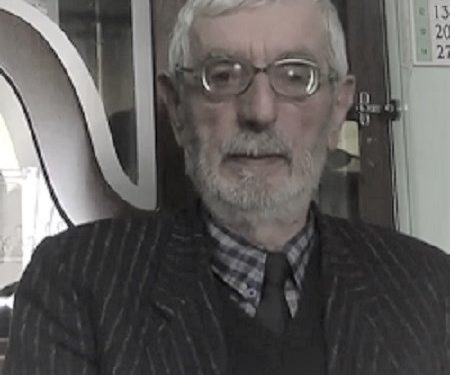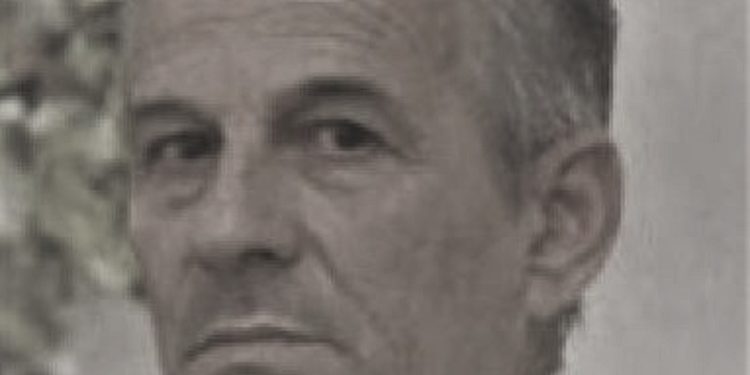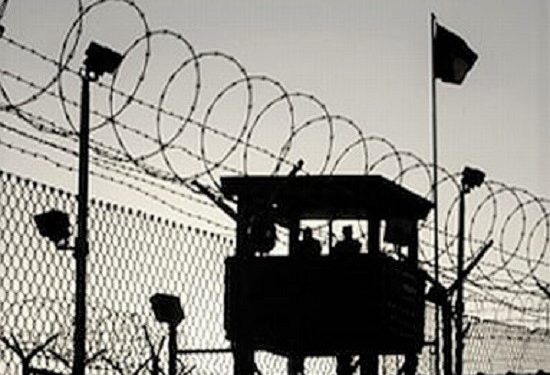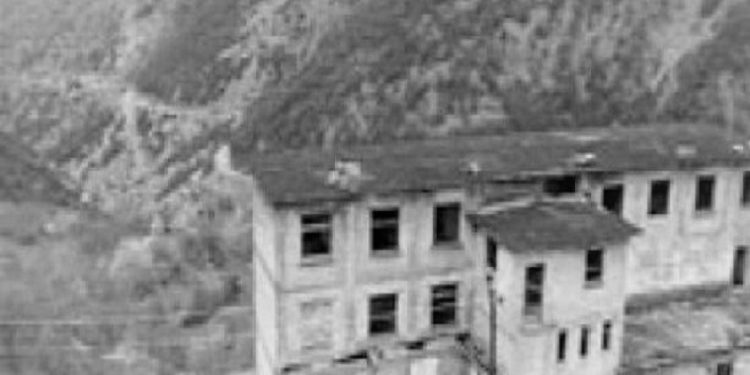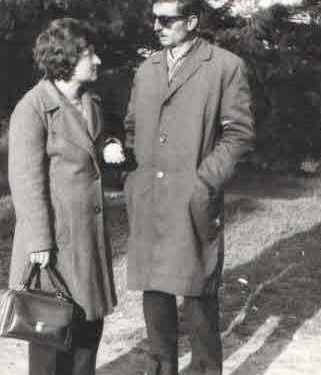From Vepror Hasani
– The rare story of Ylber Merdani, about the persecution of the Merdani family and tribe, during the communist regime of Enver Hoxha –
Memorie.al / “I had seen my mother cry often, but every time she noticed me entering the room, she would wipe her tears and try to look happy. At that time I was only 5 years old, – begins to tell the poet, Ylber Merdani from Korça, former prisoner and political exile, regarding the fate of his tribe. “When I found my mother, Fatima like that, in that state, I started to feel bad. “Mother, why are you crying”, I asked her, but she never told me. “No, he answered me, I’m not crying, it’s just that my head hurts a little.” After giving me the same answer as always, she made every effort to look happy. I couldn’t believe it, but I couldn’t understand why my mother cried so often…”!
Ylber Merdani: “My fate was predetermined…!
“One morning she could no longer hide her sadness,” Merdani continues to say. “For the first time, he didn’t even bother to wipe away his tears when I entered the room. He made no effort, even when his father entered the room. Her tears did not stop. “Okay, said my father, Fuat Merdani, take the boy and go.” Apparently my parents had discussed everything during the night. “Go”, said the father, and I noticed that he also had a tear in the corner of his eye. Mother got up, took my hand and we went outside. I was silent. I didn’t know where they were taking me, but I didn’t even have the courage to ask my mother, because even on the road she had tears in her eyes.
I noticed that we had stopped in front of the prison gate, where the Maternity Hospital is today. The mother talked to a policeman and after a while a man came out. His name was Ajdin Kulla, he was from the village of Zęblak in Korça, and his mother was his first cousin. He had been the chairman of the “National Ball”. Much later I would find out that Ajdin Kulla had been shot the day after our meeting. The mother had gone to say her last goodbye, but she had not told me anything. Apparently he didn’t want to scare me. The mother continued to cry even in front of the police. Hajdini asked him about all the Merdans, one by one, he knows them all.
When we were about to part, he put his hand on my hair and asked me: “My nephew, what will you be when you grow up?” I raised my eyes and told him not without pride: “I will become a communist”. I remember he laughed out loud. He had probably never laughed so hard in his entire life. He didn’t stop laughing even when he lifted me in his arms and kissed me. “Good, very good, you gave me back, but only uncle knows what you will become when you grow up…”! It was in 1945. 78 years have passed since that time, but I always remember his words…! Only my uncle knew what I would become…!
“Uncle’s Arrest”
It seemed as if my mother would never stop crying. For this reason, I sat and listened to see if she continued to cry like before or not. Even for many days after the shooting of Ajdin Kulla, I saw my mother depressed. It took her a long time to recover, but when I noticed that she was better, I began to feel more at ease. I had the impression that my mother’s smile would return, but it wasn’t long before she fell into despair again. One morning the mother woke up with tears in her eyes. They had arrested the father’s brother, Qemal Merdani, or the father of the well-known singer, Sherf Merdani.
It was 1951. The father was trying to support himself, but the desperation was obvious. I didn’t understand what was happening to our tribe. Ajdin Kulla was shot 5 years ago, and now they also took my uncle to prison. We were not communists. When I looked at my mother crying, I asked myself a thousand times why my parents had not become communists. At that time, I heard that if you were a communist, you mourned the beautiful houses of others, of those who were exiled or imprisoned, while those who were not communists took shelter in old houses that were about to fall down. Why this happened, I did not know.
Sadness had fallen again in our family. Qemali’s wife, Yleme Merdani, or Sherif Merdani’s mother had been arrested. Ylimeja, apart from Sherif, also had a two- or three-month-old child, Meleq, but no one asked about this. The State Security men took her away, taking the boy from her breast. They wanted to know where the people of the Merdani tribe had hidden the gold. Sherif Merdani and his brother, Meleqi, were orphaned. His two parents were in prison. Sherfi’s brother, who was 2-3 months old, needed breast feeding. Since his mother’s arrest, he only cried…! No one was able to stop him.
We thought about what could be done with this child, and in the morning the mother told me and the Sheriff that we had to take the little child and take him to the prison so that Ylemeja could give him something to drink. So we did. The Sheriff and I were small, he would take part of the road, and then I would take him. We took Meleq three times a day to the prison, where the Sheriff’s mother breastfed the child. For a long time, Meleqi became a regular visitor to the prison, until one day a doctor, Selaudin Bekteshi, said: “Either release the woman, or take the two-month-old child to prison, because otherwise, the child may die “. Fortunately, Ylemeja returned home, while her husband continued to be held in prison.
“They kicked us out of the house”
It was not said that my mother would see a white day. In 1957, some government people came to our house and told us that we had to leave the house. The party had found us another shelter, while in our house, the prison commander and other commanders would be housed. I remember that my mother did not want to come out, but the Security people took her by the arm and took her out. They did the same with my father. Unlike mother, father wanted to be more resistant, but I saw that they hit him. One of them grabbed him by the throat. I was shocked to see my father in that condition. I jumped on top of the policeman to help my father, but he pushed me too.
We were in the middle of four roads. The mother was in tears again. They took us to an old house, which was a real desert. It was simply a ruin. The mother did everything she could to fix it somehow. He placed family photos on the walls. He tried to put something decorative, but he couldn’t find a suitable place. One evening, while everyone was silent, I asked why they had kicked us out of the house. Father said that they wanted us to give them the gold and all the wealth we had. “Give it to me, I told them, why don’t you give it to them”.
My father gave me a weary look and said: “We gave you everything, son, now we have nothing left.” We have nothing more to give them.” Father was quite tired. He had lost a lot of weight and it had been a long time since I had seen him laugh. “What about the Sheriff’s father, I asked him, why was he arrested”?! “For the same thing”, said my father he also had nothing left to give them.” After the answers that my father gave me, I began to wonder how it was possible for the communists to deport and put in prison, when people had nothing left to give.
Suddenly I looked at my mother and asked: “Communists are good or bad”? The mother looked at once from the father with startled eyes. My father looked at me, he wanted to speak, but he thought for a moment: “When you grow up, he said, you will understand what communists are.” After a year we felt calmer. We had begun to get used to our new home…!
Meeting with Genc Leka
My mother had always cried bitter tears, but when she was told that your son, Ylber Merdani, will go to school to continue his studies as a teacher, I saw that her eyes were not sad and filled with pain as before , even though he was in tears. “Maybe from now on they’ll leave us alone,” said the father, but from the sound of his voice, he seemed unsure of what he was saying. I finished my studies in 1959.
During my studies at the Pedagogical school, I met a girl from Suli i Devolli, Shpresa Ballollin. After finishing school, both teachers went to the villages of Librazhdi. There we also met Genc Leka. We talked a lot about poetry, because at that time I was also writing poetry. We stayed in Librazhd until 1966. I told Genci all my childhood experiences. He would sit in thought and then answer me with a poem he had read days before. They were beautiful poems that I liked a lot.
“Internment”
In vain, the father had thought that the Merdan tribe had been forgotten by the communists. The failure to deliver the gold had come up again. (I don’t know if we had any more gold). The deportation order had arrived in our family. I remember it like today. A “ZIS” type military car, covered with dark raincoats, stopped in front of our house with a terrifying noise. We had been informed in the evening of our detention, and during the whole night, we had not slept for a single moment. Although we did not want to obey, we had prepared the spoils.
As soon as the car stopped, the policemen got out of it and some people who had brought them to load our spoils. The same scene happened as that day when they had kicked us out of the house. The father did not want to obey, while the mother, as always, could not contain herself. The father asked: “Well, at least tell me why I should be exiled, what have I done”?! No one answered. They took us by the arm and put us all in the car. They covered the back of the body with raincoats and we set off.
It was only after a few hours of travel that they told us to get off. We had arrived in the village of Pulahë in Opari. They left us there and ran away. We settled in an old house, which apparently had been a crib. It was my mother who started to fix our new house as best she could. His sister, Jadigjari, who was called Jadi for short, was already helping him. For days I was completely haunted. I was unable to understand what was happening to our family.
“Poems”
Only after a few days I realized with horror that my parents were very old. Mother was quite gray. What I had found at that moment left me terrified. That we were all shocked, but sadness like that of the mother had not caught my eyes. Only when the evening fell, I took a letter and started to write what I felt about my mother: “Seeing the tears of the old mother, / Seeing those ashes tremble, / Seeing the house on fire, / When you have neither strength nor help, / It’s terrifying, when your hands are tied, / You clench your fists, your eyes full of tears, / You can’t hold back even bitter sorrow, / You want to speak, but you can’t speak…”!
I started writing such poems in those days of exile, there in Pulahë of Opari, where the chicken ate stones. We were poorer than ever. Apart from exile, we had no other assets. We celebrated the birthday of my sister, Jadi, with what happened to us, while I was going to write a poem again: “We don’t have crystal glasses / Poverty wanders around the table / we chew water and mountain air / Freedom sleeps in our hearts…”!
There were other internees in Pulaha. Of course, we had more faith in him. I also showed the poems I wrote to an internee whom I considered a good friend, but it was not like that. As soon as he found out what was said in my poems, he held his breath in the Department of Internal Affairs. I didn’t know, but one day near my feet, Dega’s “Gas” stopped. I was arrested “in the name of the people”. It was June 9, 1969
“Investigations”
I kept the poems I had written in the most secret places so that no one would find them, but when I found myself in front of the investigator, he put a bunch of papers in front of me, as if they were grenades that would explode at any moment. “These are yours”, he asked me. I picked them up and took a look. They were my poems, just as I had written them the day I saw my old and gray mother. As soon as I read the first line, I remembered my mother again. She would probably be crying at that moment. I was sure that by now the grays would cover it all. I prayed to God just to see him alive one more time.
“They are mine”, I answered the question of the investigator. “When would you publish them”, he asked, not without irony. “When the time comes”, I answered. I had nothing to lose and nothing to gain. I knew that my country would be in prison from now on. Our fate was foretold. I remembered the words of Ajdin Kulla, who told me: “Only my uncle knows what you will become…”! And he was right. I could not become a communist, our dough was made differently. The interrogator again broke me from what I was thinking.
“Did you meet Genc Leka in Librazhd”, was the next question. “Of course”, I replied, we were teachers there, we also took pictures”. “That poet is also like you”, asked the investigator again. “He is a good poet”, I answered. “Genci has seen your poems”? “No, I answered you, I wrote all this in Pulah of Opari. “If only he would show him his poems.” “No, I replied, we generally talked about the students.” “Hmm, for the students, what did you say to the students, that it’s terrible when your hands are tied, that it’s terrible when you want to speak and you can’t”? After that, they started to torture me. I spent many such days, where the questions were about poems and Genc Leka. It all came to an end when I walked into the courtroom and was sentenced to 8 years in prison.
They sent me straight to Spaçi prison. I was convicted for my manuscripts. I stayed in Spaç for 8 years in a row. There I also became a member of the Spač Revolt. (May 21-23, 1973). In June 1973, Sherif Merdani, the uncle’s son, was also brought to Spaçi prison. Everyone welcomed him with respect and everyone tried to ease his pain as much as possible. In December 1974, when the song festival was held in Tirana, the prisoners of Spaç, in the second zone, when they were on their third shift, we improvised a festival, there on the mountain, because there were other imprisoned singers in Spaç.
The first prize was won by Sherif Merdani, where he was awarded 30 days of winter dungeon. The sheriff had been sentenced to 10 years in prison for political reasons, but he would be sentenced again to another 10 years in prison. He was released in 1977. That year I was also released. Meanwhile, my family had completed their internment in the village of Pulahë, but with another internment order, they were taken to the village of Shtyllë. The family was exiled to Shtylle in 1975, at the time of the slogans. I learned that only from the city of Korça, 60 families were interned, while the entire Merdan tribe was interned.
“From prison to exile”!
I left for the village of Shtylle. The family of Shpresa Ballolli, my girlfriend, was also interned there. When I arrived in the village, in addition to the family, she was also waiting for me. At first I met the mother and father; I saw that they were very old. They were completely embarrassed. We threw ourselves around each other’s necks and stayed like that for a moment. We had not met for 8 years. I felt the same longing when I felt Hope’s hand. “Come, she asked me, I’ve been waiting for you…”!
I shook his hand; the shaking of two hands spoke volumes. His father was waiting for him for dinner, said Hope. After two months we got married, we got married there, in the exile village, in Shtylle. There I also found Reshat Merdani, my father’s older brother. He had been an excellent student, he had studied Finance in France, but from now on he would be there, in exile. From the marriage with Shpresa, I had two children, Fatbardha and Ermal.
Hope, my friend, told me that her father, Veli Ballolli, was sentenced to be shot, as being involved with the “Group of Deputies”, but he was finally sentenced to 14 years in prison. He died there in Styla. The villagers did not want to accept him in their cemetery. No, not even the dead could be confused with a man who had a bad biography. The regime also decided about the afterlife. Ballolli was buried in a place separated from the village. From that day on, that grave was called “Kulak’s grave”.
To this day it bears the same name. His remains are no longer there, because the family took them to his hometown, but the “Kulak’s grave” remains there. In 1980, my father, Fuati and my uncle Reshati died there in Shtylle, while my mother passed away in 1989, so they all remained there in Shtylle. We were 9 families. In that village, my wife’s mother also closed her eyes. I was not lucky enough to see them even for a single moment without tears in my eyes.
“The Merdans”
“The Merdans settled in Korça here 300 years ago. They were the most famous merchants of the city of Korça. Rexhepi, my uncle”, – says Ylber Merdani – was one of the most popular merchants of Korça. In 1919, they formed the trading firm “Magazia Drêtësia- Rexhep Merdani Ko”, where Fuati, my father, Qemali and Reshati, my two uncles, were co-owners. It is already documented that the Merdani tribe were well-known benefactors of the city of Korça. They paid the dowries of poor girls, orphaned children. While they gave gifts to poor families from time to time. They helped the schools, the hospital, and the orphanage. They never hesitated to provide funds for road construction.
They helped their colleagues to open stores, while giving them goods free of charge, in order to pay them off as they had sold the goods, but also when they had strengthened their economic positions”, Ylber Merdani, author of many books of poetry, initiator of the creation of the Association of former Persecuted and Political Prisoners, where his wife Shpresa participated, a member of the hunger strike in Korça, which ended in September 1991. He is now the Honorary Chairman, of the Association of Former – Persecuted and Political Prisoners”. Memorie.al




